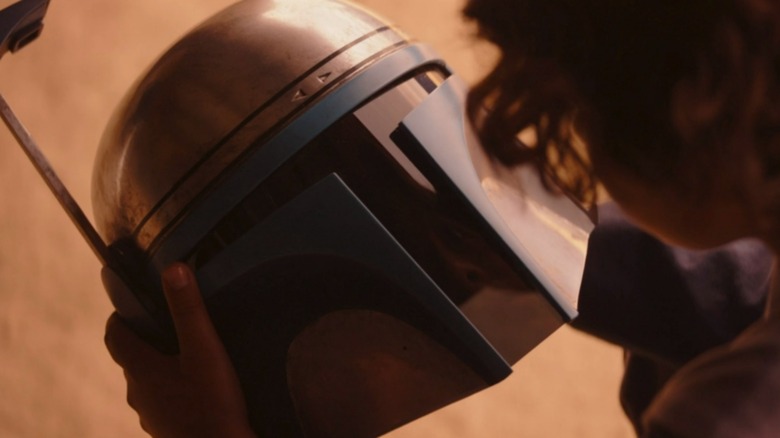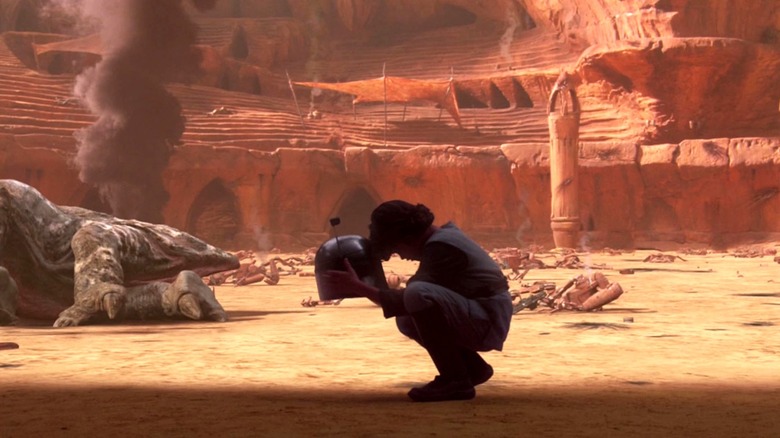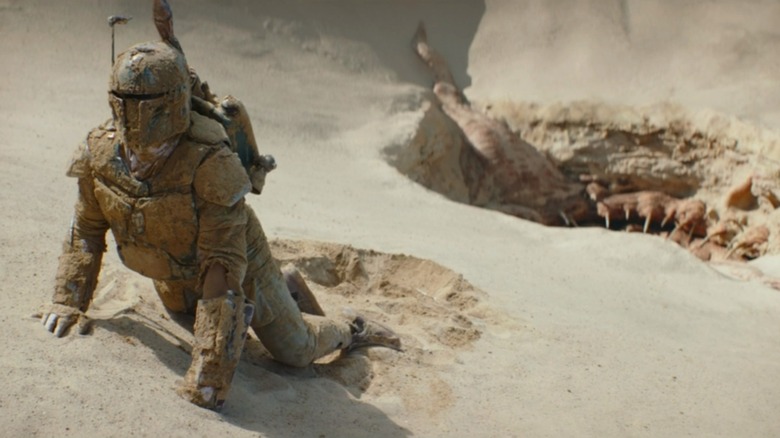No, That Book Of Boba Fett Flashback And Attack Of The Clones Scene Don't Perfectly Match ... And That's Okay
There's just something about "Star Wars," isn't there? Ever since taking an entire generation by storm and lighting their collective imaginations on fire back in 1977, George Lucas' unfathomably popular story about Jedi, princesses, lovable rogues, and space opera adventures continues to have the same effect on countless fans around the globe. It's the biggest reason why we're driven to scrutinize every Easter egg and dive deep into the many influences that make up "Star Wars." The overall reaction to any given aspect of the franchise, positive or otherwise, can go a long way towards commenting on how we as a species engage with and digest our favorite pop culture media.
But then there's the darker, ugly side of the equation. As passionate and well-intentioned as many fans can be, "Star Wars" is notorious for revealing the absolute worst qualities that we're all capable of. If you're tempted to reject that notion, just think of Jake Lloyd, Hayden Christensen, Ahmed Best, Kelly Marie Tran, and many more actors who undeservedly bore the brunt of angry fans who couldn't separate living, breathing human beings from the fiction they found disappointing.
While the overall reactions to "The Book of Boba Fett" thankfully haven't risen to that level of abuse and toxicity, one seemingly minor complaint from last week's series premiere has continued to boil over in the days since. Early in the first episode, Boba Fett's regenerating bacta tank nap leads to flashbacks of previous moments in the bounty hunter's past — both familiar and otherwise never-before-seen. One scene brought us back to young Boba Fett (played by Daniel Logan in "Attack of the Clones") witnessing his clone "father" Jango's death. The prequel era of "Star Wars" tends to be a hotbed of controversy in and of itself, which is precisely what makes this latest development so ironic. Fans took to social media to complain about a lack of faithfulness to that original scene, which we previously reported came about as a result of minor reshoots during production of "The Book of Boba Fett."
I'm here to tell you that not only is this the furthest thing from a "continuity error" and simply not a big deal at all, but is actually a promising sign for this new era of "Star Wars."
Different Stories, Different Goals
First and foremost, we need to make a couple of facts abundantly clear. Yes, the background and framing of both scenes are wildly different. You can get a better look at these apparent inconsistencies thanks to a post by the Cinematic Captures Twitter account, which helpfully places the footage from "Attack of the Clones" and "The Book of Boba Fett" one on top of the other. However, fans are nothing if not insistent about maintaining a seamless, unbroken sense of verisimilitude from one piece of "Star Wars" media to another. According to the most vocal complaints, the jarring differences in the background and framing of both scenes are proof of laziness at best, and outright provocation of "real fans" at worst.
Attack of the Clones // The Book of Boba Fett pic.twitter.com/z3A0CkuxUX
— Cinematic Captures (@CineCaptures) December 29, 2021
But here's an equally crucial fact: as /Film's Peter Sciretta rightfully pointed out, both sequences are attempting to accomplish wildly different end goals. In "Attack of the Clones," the epic gladiatorial arena battle sequence serves as the backdrop to an even larger tragedy. The skirmish between the Jedi and the Geonosians is essentially the first large-scale shot fired in what would eventually become the Galactic Civil War depicted in the original trilogy, further emphasized by the Death Star plans escaping and, of course, Boba Fett's villainous origin story beginning by witnessing the death of Jango. The intentional choice to frame young Boba amid the carnage of battle with his father's helmet (sans Jango's decapitated head, importantly!) adds to the sweeping operatic flair of the prequel films and feels perfectly of a piece with Lucas' overall aims.
"The Book of Boba Fett," meanwhile, offers several reasons why the scene looks different in the show. Importantly, the episode contextualizes this flashback as a dream sequence from an unreliable narrator. We're looking at it from Boba's own eyes, which means the battle droids and reek corpse in the original background simply aren't the focus — his loss and extreme loneliness is. But if that doesn't satisfy you, take it straight from "Star Wars" guru and longtime Lucasfilm employee Pablo Hidalgo, who suggests another sensible explanation: Different camera lenses capture images differently. If one really needs to justify their head-canon, think of this as no different than the famous dolly zoom in "Jaws," which radically changes the background from one second to the next.
Different stories demand different storytelling needs. And you know what? That's more meaningful than copy/pasting one scene onto another.
Star Wars Needs To Move Forward, Not Look Back
Don't get me wrong; I'm not saying there aren't any valid criticisms of "The Book of Boba Fett." In fact, that only makes all this noise about one minor shot in the first episode feel like even more of a waste of time! /Film's Eric Vespe already detailed one potentially thorny issue regarding the show's main protagonist, but here's another one that ties in neatly with the topic at hand. The entire premise of "The Book of Boba Fett" is predicated on breathing new life into a decades-old villain who, for all intents and purposes, had already served his purpose in the original trilogy and had since been supplanted by the overwhelming popularity of Din Djarin (Pedro Pascal) in "The Mandalorian." It's a tall task for "Star Wars" to keep attempting to expand the stories of established characters into spin-offs of their own — the lowly box office receipts of "Solo: A Star Wars Story" are proof enough of that.
Here's why I think this whole background controversy is actually a promising sign: Hopefully, it shows that this series isn't bound by the constraints of remaining overly reverential to previous "Star Wars" installments. Painstakingly recreating a blink-and-miss-it moment from "Attack of the Clones" would no doubt please the die-hards, but at the cost of robbing "The Book of Boba Fett" of even the tiniest amount of personality that it could potentially create for itself. Instead, an otherwise nondescript moment of Boba Fett's past can take on the feel of a mission statement of sorts, teasing the possibility that this series will continue to remix and refresh our conceptions of "untouchable" franchise iconography.
By all means, let's hope "The Book of Boba Fett" keeps adding new layers to the Tusken Raiders, turning them from the harmful stereotype of mindless savages in the original and prequel trilogies to much more complex communities. Give me more bait-and-switches involving conspicuously missing Rancors that purposefully shy away from indulgent nostalgia and fan-service. Hell, I'm completely in favor of this series introducing the irresistible mystique of Jabba the Hutt's fabulous cousins, a genuinely original addition to "Star Wars" lore that I never knew I needed until now.
Every fan will have their own positive and negative takeaways from "The Book of Boba Fett," but let's just make sure they're worth the fuss, yeah?


